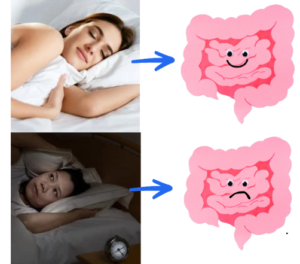Exploring the Essential Link Between Quality Sleep and Digestive Health
Sleep is not merely a state of rest; it is a critical process that significantly influences our digestion and overall health. The connection between sleep and digestive wellness might not be immediately apparent, yet it encompasses a myriad of physiological processes that harmoniously interact. The body’s circadian rhythm, which acts as an internal biological clock, governs both sleep cycles and digestive functions. This synchronisation explains why individuals often feel hungry at specific times each day, highlighting the body’s remarkable alignment with natural biological rhythms that dictate our daily lives.
Maximising Digestive Function Through Quality Sleep 
Sleep is essential for the body’s capacity to heal, rejuvenate, and restore itself efficiently. The phases of deep sleep are particularly significant for these restorative functions. During these critical cycles, the organs, tissues, and cells that constitute the digestive system not only experience much-needed relaxation but also partake in vital repair mechanisms. The body prioritises cellular repair and renewal during deep sleep, concentrating on regenerating the cells that line the digestive tract, which constantly undergo wear and tear due to food particles and digestive enzymes. This regenerative process is crucial for preserving the integrity of the gastrointestinal lining, which, in turn, boosts digestion efficiency.
Deep sleep also plays a pivotal role in fortifying the immune system, which is particularly vital for the digestive system. This system hosts its own unique immune cells, activated by the beneficial bacteria residing in the gut. These immune cells are crucial for safeguarding the gut and the entire digestive system from harmful microorganisms, thereby ensuring a balanced population of bacteria within the gut environment.
Moreover, the organs within the digestive system are critical for detoxifying the body, aiding in the expulsion of waste and harmful substances. Deep sleep considerably enhances this detoxification process by optimising the operational efficiency of the liver and kidneys, allowing these essential organs to function at their best. This synergistic relationship between sleep and detoxification is vital for fostering overall digestive health and wellness.
Examining the Effects of Sleep Patterns on Gut Motility
A fundamental aspect of digestion is the efficient movement of food and waste through the <a href="https://limitsofstrategy.com/the-impact-of-sleep-on-your-digestive-system/">digestive tract</a>, a process commonly referred to as gut motility. This process undergoes notable changes during sleep. Throughout both deep and light sleep, the rate of gut motility significantly decreases. This decrease is a necessary adjustment, allowing the digestive system to conserve energy, which is then redirected towards repairing digestive tissues. Such energy conservation enables the digestive process to function more effectively when awake, optimising both nutrient absorption and waste elimination.
The migrating motor complex is a critical cycle of contractions that occurs during fasting periods, including sleep. This cycle is vital for gut motility, as it effectively clears away food particles and residues that may remain in the digestive system. This natural cleansing mechanism of the digestive tract reduces the risks of bacterial overgrowth, fostering a healthy gut environment. Notably, the migrating motor complex is most actively engaged during the night when individuals are fasting and asleep, underscoring the essential role of sleep in maintaining the health of the digestive system.
As dawn approaches, gut motility gradually increases, preparing the digestive system to efficiently process and digest food. This rise in motility can also trigger the first bowel movement of the day, demonstrating the finely tuned relationship between sleep and gut motility. Recognising this connection is crucial for optimising digestive health and enhancing overall well-being.
Investigating the Influence of Hormones on Sleep Patterns and Digestive Processes
Ghrelin, often referred to as the hunger hormone, plays a significant role in stimulating appetite. In contrast, leptin communicates to the brain that one is feeling full, thereby helping to prevent overeating. Together, these hormones are vital for regulating appetite, yet their functions can be adversely affected by insufficient sleep.
Even just one night of inadequate sleep can lead to elevated levels of ghrelin, igniting a heightened appetite and often resulting in cravings for carbohydrates. This phenomenon is frequently described as feeling ‘hangry’. Additionally, leptin levels can decrease after a night of poor sleep, disrupting the signals that indicate fullness. This creates a challenging scenario where individuals may overindulge and struggle to interpret their body’s cues to stop eating. While a single night of poor sleep may not yield dire consequences, chronic insomnia can lead to significant digestive issues, including gut inflammation, liver disorders, gastroesophageal reflux disease, inflammatory bowel disease, and even colorectal cancer, in addition to contributing to weight gain.
Understanding the Consequences of Sleep Disruptions on Digestive Health
Disruptions to sleep can lead to a variety of digestive issues. Factors such as shift work, particularly night shifts, and the experience of jet lag can significantly interfere with sleep patterns and disrupt the body’s internal clock. Furthermore, late-night eating or irregular meal times can adversely affect the quality of sleep. The circadian rhythm that governs sleep is closely linked to natural sunlight, which is essential for maintaining a healthy sleep-wake cycle.
Unfortunately, in our modern, technology-driven world, many individuals spend a considerable amount of their time indoors, resulting in reduced exposure to natural light. This shift has led to increased exposure to blue light emitted by devices such as laptops, televisions, and smartphones, which further disrupts the sleep cycle and sleep patterns, especially when this exposure occurs shortly before bedtime.
The cumulative impacts of these factors can lead to serious digestive issues, including diarrhea, ulcers, inflammatory bowel disease, or disruptions in the delicate equilibrium between beneficial and harmful bacteria in the gut. This imbalance can also inflict damage to the gut lining, complicating the situation regarding digestive health.
Improving Microbiome Health Through Quality Sleep Practices
The microbiome is composed of trillions of microorganisms residing in the gut, primarily consisting of beneficial bacteria known as probiotics, along with viruses, fungi, and potentially harmful bacteria. These microbes are essential not only for overall health but also for digestive wellness. They enhance the immune response and assist in digestion, contributing to the production of specific vitamins, enzymes, hormones, and amino acids. Recent studies have uncovered a significant connection between the microbiome and sleep, indicating that disrupted sleep or chronic insomnia can negatively influence the balance of these microbes, ultimately impacting digestive health and overall well-being.
Exploring the Complex Interactions Between Microbiome Health and Sleep Quality
The correlation between sleep and microbiome health is intricate and multifaceted. Insufficient sleep can adversely affect microbiome health, while an unbalanced microbiome can similarly impact the quality of sleep. To comprehend this complex interaction, one study highlighted a relationship between a higher abundance of specific bacterial types in the gut and faster sleep onset, along with fewer night awakenings. Although this article cannot encompass all findings, the key takeaway is that nurturing a diverse and abundant population of beneficial bacteria in the gut is vital for achieving optimal sleep, effective digestion, and maintaining overall health.
Evaluating the Interconnections Between Stress, Sleep, and Digestive Health
A common outcome of stress and anxiety is disrupted sleep. Conversely, these mental health challenges can also adversely affect the physical health and functioning of the digestive system. This disruption can lead to altered gut motility and contribute to issues such as indigestion, ulcers, and irritable bowel syndrome. A critical factor in this dynamic is the influence of the so-called stress hormone, cortisol.
Understanding the Role of Cortisol in Modulating Digestive Processes
When cortisol levels escalate, the body reacts by entering a fight-or-flight state. This physiological response results in blood flow being redirected to critical areas such as the heart, brain, lungs, and muscles while being diverted away from the digestive system. Such a response equips the individual to either confront danger or flee, a reaction that was crucial for survival in ancient times.
In today’s context, however, stressors are often less life-threatening, such as financial concerns, job pressures, or inadequate sleep. While temporary redirection of blood flow may be beneficial in acute situations, chronic stress can inflict considerable harm on the digestive system, particularly regarding gut motility. This can manifest in symptoms such as constipation, diarrhea, indigestion, gas, and bloating. Therefore, adopting effective stress management techniques is essential for supporting both gut health and achieving restorative sleep.
Ensuring adequate sleep is vital for maintaining a healthy digestive system, as the interplay between sleep and digestion is inherently interconnected. Prioritising effective sleep hygiene practices is crucial for achieving restorative sleep. This includes minimising exposure to blue light from electronic devices, establishing a consistent sleep schedule, creating a cool, dark sleep environment, avoiding food intake within two hours before bedtime, and ensuring exposure to natural light during the day, particularly in the morning.
References
Understanding Digestive Health and Circadian Rhythms
Exploring Sleep Dysfunction and Digestive Conditions
Examining the Link Between the Gut Microbiome and Sleep
Investigating Stress and Its Effects on the Digestive System
The Article: How Sleep Affects Your Digestive System appeared first on https://janestevensnutrition.com
The Article: Sleep’s Impact on Your Digestive System Explained appeared first on https://janestevens.net
The Article Sleep’s Impact on Digestive Health Explained Was Found On https://limitsofstrategy.com


